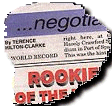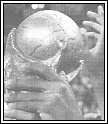FOOTBALL
FANS around the globe - including Trinidad and Tobago - are in serious
danger on missing out on full live coverage of the next two World
Cups because the game's governing body, FIFA, has awarded the rights
for the 2002 and 2006 tournaments to a German pay-per-view media group.
The decision to award the world wide television rights to Kirch is
perhaps the ultimate example of the growing influence of cable and
pay-per-view TV on sports and, in particular, football. The result
of this move is expected to seriously curtail the chances of basic
television coverage, previously available when rights were controlled
by the European Broadcasting Union
(EBU ).
This
means that only customers of cable or pay-television satellite services
such as Direct TV will be able to witness all games from these World
Cups. The average football fan, who has only basic television, is
likely only to witness a couple of games - if any at all. Europeans
are already expressing their fears verbally, in light of FIFA's
2.8 billion Swiss francs
( US $ 1.8 billion ) deal with Kirch. EBU secretary-general Jean-Bernard
Munch lamented that, " In 2002, many matches will only be seen
by those who can afford pay TV channels. This will spoil the excitement
of the World Cup."
Trinidadian
football fans will probably be no better off, even though the next
tournament is too far away for the full effects to be accurately
gauged. Bernard Pantin, head of Direct TV Trinidad and Tobago, confirmed
that "We haven't got that far as yet" for an accurate
assessment to be made of the consequences; and that the issue "hasn't
filtered down" to the region.
|
However,
he did offer a suspicion that, " In the future, there will be
some mixture" of both available and non available games.Pantin,
himself, speculated on how FIFA will seek to attract sponsorship now
that it will not be able to attract 1.8 billion viewers. Coca-Cola
for instance, he said, may be reluctant to post their billboards and
that it is now FIFA's problem to deal with the new economics. Meanwhile,
he confirmed that it is too early for CCN TV 6 , local broadcasters
of the last two World Cups, to make any definite statement on the
matter.
Cable
television, which had long taken charge of boxing, has extended
its control over a multitude of disciplines.A major turning point
in football came in 1992 when the newly formed English Premier League
signed a contract deal with Sky TV.
Other firms, such as Canal + in France, soon followed suit, meaning
that certain games during a season are now only available to customers,
and even only those living outside of specific geographical confines.
For instance, those living in and around Milan, Italy, will be unable
to witness a top clash such as
AC Milan/Juventus unless they are in the San Siro Stadium.
The
lucrative UEFA Champion's League was also partially conceived by
European TV moguls such as Leo Kirch and AC Milan owner Silvio Berlusconi
, and is now viewed as the forerunner to the now inevitable formation
of a European Super League comprising top clubs such as Milan, Manchester
United, Real Madrid, Paris St Germain and FC Porto. The incursions
of Kirch, Berlusconi and Rupert Murdoch ( who numbers the FOX Sports
Network among his many cable and satellite acquisitions) on football
is gradually dragging the global game the way of boxing and basketball.
|
A
September 1996 investigative report in World Soccer
magazine asserted that, " By the start of the next millennium......football
will be dictating a twin track approach to TV coverage : top international
and domestic matches will be available live to subscription to cable,
satellite or pay-per-view, while free coverage will be available in
'mere' late night highlights programmes via the state broadcasters."
The
effects of these trends are already being witnessed here in Trinidad
and Tobago. The once popular Italian Football and European Football
programmes which were shown on TTT and TV 6 respectively up to 1993,
are now only available on the ESPN International cable sports network.
ESPN International has carried Brazilian, English, Dutch and Italian
football for the last number of years and will be adding the Spanish
Primera Division to its line-up from next season. Next month, the
downtown Port of Spain based Cableview cable company will be adding
FOX Sports - which shows Argentine football and friendly international
matches- to its list of networks. As indicated before, football
is not the only discipline affected. Local sports fans would have
noticed that top class boxing, which was last shown on TTT in 1994
and TV 6 in 1996, is now only available on cable networks HBO, Showtime,
ESPN and USA apart from pay-per-view via Direct TV.
NBA basketball is mostly shown on ESPN and TBS during the regular
season, with TTT only showing games delayed on Friday nights and
Saturday afternoons. Up until this year, the World Cup had been
free of the grips of pay-per-view television. Now this has changed
- perhaps forever. How the average Trinidadian and Tobagonian sports
fan reacts and deals with this new reality remains to be seen, as
we all approach the next millennium.
|



![]()




